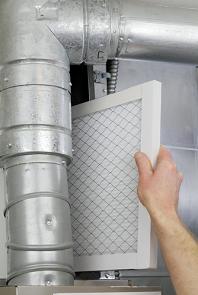
Lower-efficiency filters
The efficiency of filters is measured on a minimum efficiency reporting value (MERV) scale. This scale ranges from 1 to 16, with most residential options ranging from 4 to 12. A MERV 4 filter is quite inexpensive, yet it captures about 80 percent of particles measuring 50 microns or larger. It fails at capturing more than a quarter of the particles sized 3 to 10 microns, however, which is where the limitations of a MERV 4 filter can be seen.
Mid-range filters
Many homeowners enjoy the balance between the cost and filtering power provided by MERV 7 or 8 air filters. These filters can capture up to 95 percent of particles measuring as small as 5 microns. This is more than efficient enough for most homes.
High-efficiency filters
MERV 9 and higher air filters are appropriate for households where occupants have severe allergies or immune system problems. They can trap up to 99 percent of allergens measuring as small as 0.3 microns. If you choose an air filter with this high a rating, you must be dedicated to changing the filter once a month to prevent detrimental airflow restriction. You may also need to have a technician boost the fan speed in order to compensate for the decrease in airflow.
In the end, the exact filter you choose will depend on what you need to filter from the air, how much money you’re willing to spend and how diligently you maintain the filter. For more information about choosing air filters for your home, please contact us at Rodenhiser Plumbing, Heating & Air Conditioning in Holliston. Serving the Route 495/128 area, we're always happy to help.
Our goal is to help educate our customers about energy and home comfort issues (specific to HVAC systems). For more information about other HVAC topics, download our free Home Comfort Solutions Guide.
Air filter image via Shutterstock